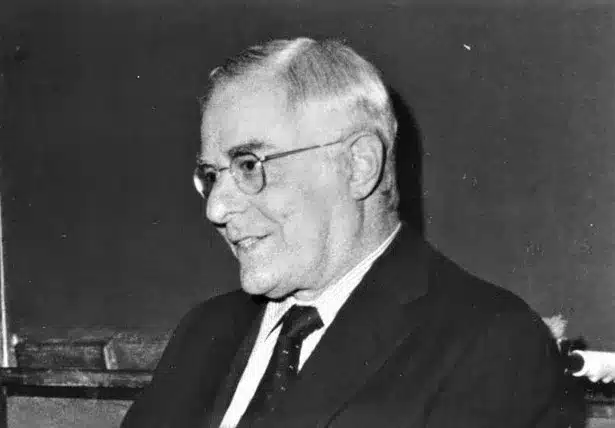The Life and Achievements of William Howard Stein

William Howard Stein (25 June 1911 – 2 February 1980) was an American biochemist. He won the Nobel Prize in Chemistry in 1972.
Early Life And Education
William Howard Stein was born on June 25, 1911, in New York City into a Jewish family. His father, Fred M. Stein, was a businessman who retired early to support local New York health organizations, and his mother, Beatrice Borg Stein, was a children’s rights activist who developed afterschool activities. Stein’s parents were staunch advocates for the welfare of society and fostered his interests in the life sciences from a young age. For his education, Stein attended the progressive Lincoln School, sponsored by the Teachers College of Columbia University, where he explored the natural sciences through field trips and science projects. At sixteen, he transferred to the Phillips Exeter Academy in New England to prepare for higher education. Stein began his higher education as a chemistry major at Harvard University in 1929 and later transferred to the Department of Biological Chemistry at the College of Physicians and Surgeons, Columbia University, to focus on biochemistry.
Career And Achievements
William Howard Stein was an American biochemist whose significant contributions to the field were recognized with numerous awards and honors. Alongside his colleague Stanford Moore, Stein developed the automatic amino acid analyzer, revolutionizing chromatography and paving the way for modern techniques such as liquid and gas chromatography. His academic journey began at Harvard University and continued at Columbia University, where he completed his Ph.D. with a thesis on the amino acid composition of elastin. Stein’s illustrious career was further adorned with accolades such as the American Chemical Society Award in Chromatography and Electrophoresis in 1964, the Richards Medal of the American Chemical Society in 1972, and honorary degrees from prestigious institutions like Columbia University and the Albert Einstein College of Medicine of Yeshiva University. His legacy extends beyond his scientific achievements, as he was a mentor and inspiration to many in the biochemical community. Stein’s work remains a cornerstone in the field of biochemistry, reflecting a lifetime dedicated to advancing scientific understanding.
Notable Events And Milestones
William Howard Stein early education at the Lincoln School fostered his interest in the sciences, which was further honed at Harvard University and Columbia University, where he completed his Ph.D. with a thesis on the amino acid composition of elastin. Stein’s collaboration in determining the ribonuclease sequence and its catalytic activity was groundbreaking, earning him the Nobel Prize in Chemistry in 1972.
Stein’s invention of the automatic amino acid analyzer revolutionized the field of chromatography, paving the way for modern methods like liquid and gas chromatography. This invention not only transformed biochemical research but also had far-reaching implications in various scientific fields, including pharmacology and genetics. His contributions to society extend beyond his scientific achievements; his parents’ involvement in health and children’s rights activism influenced his values and dedication to societal welfare. Stein’s legacy is evident in the continued use of his methodologies in biochemistry, which remain fundamental to our understanding of protein structures and functions. His work has had a lasting impact on medical research, particularly in the study of enzymes and their roles in human health and disease. The tools and techniques he developed have been instrumental in the progress of personalized medicine, where treatments can be tailored to individual genetic profiles.
Moreover, Stein’s impact on culture and education is reflected in the emphasis on interdisciplinary approaches in scientific research and education, encouraging a generation of scientists to integrate techniques from various fields. His life’s work exemplifies the importance of curiosity, innovation, and cross-disciplinary collaboration in driving scientific discovery and societal progress. William Howard Stein died on 2 February 1980, in New York, USA.
Awards And Honors
- Nobel Prize in Chemistry (1972) for his work on the structure of ribonuclease.
- American Chemical Society Award in Chromatography and Electrophoresis (1964) shared with Stanford Moore.
- Richards Medal of the American Chemical Society (1972) shared with Stanford Moore.
- Kaj Linderstrøm-Lang Award, Copenhagen (1972) shared with Stanford Moore.
- Elected as a fellow of the American Academy of Arts and Sciences.
- Recipient of a National Science Foundation Science Faculty Fellowship.
- John Simon Guggenheim Memorial Foundation Fellowship.
Additional Resources
Books:
- “William H. Stein – Biographical” available on the Nobel Prize website provides a detailed account of his life and scientific contributions.
Documentaries:
- While specific documentaries on William Howard Stein are not readily found, the Nobel Prize website often features interviews and lectures by laureates which can be insightful.
Museums:
- The Nobel Prize Museum in Stockholm showcases the contributions of Nobel laureates, including William Howard Stein, and is an excellent place to learn about his work.
- Science museums, particularly those with exhibits on chemistry and biochemistry, may feature displays on Stein’s work and its impact on the field.
These resources can provide a deeper understanding of Stein’s scientific achievements and his legacy in the field of biochemistry.
Observer Voice is the one stop site for National, International news, Sports, Editor’s Choice, Art/culture contents, Quotes and much more. We also cover historical contents. Historical contents includes World History, Indian History, and what happened today. The website also covers Entertainment across the India and World.

